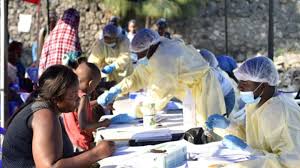The declaration is based on the continuous spread and unsuccessful efforts to contain the disease in the DRC. It followed a meeting of the International Health Regulations Emergency Committee for EVD in the DRC.
The committee cited recent developments in the outbreak in making its recommendation, including the first confirmed case in Goma, a city of almost two million people on the border with Rwanda, and the gateway to the rest of DRC and the world.
This was the fourth meeting of the emergency committee since the outbreak was declared on August 1, 2018.
Ebola in Eastern DRC
On August 1, 2018, the Ministry of Health of the DRC, declared an outbreak of EVD in North Kivu Province.
This is the tenth outbreak of the disease over the last four decades in the Democratic Republic of the Congo.
The DRC Ministry of Health, WHO, other UN organizations, non-governmental organizations, and many partners have been responding to the outbreak since August 2018.
Unfortunately, they have not been able to successfully contain the disease as many people in the Eastern part of the country cannot be reached for vaccination.
Due to this factor, the disease was reported in the neighboring country of Uganda and most recent, reported in Goma, the largest city, east of the DRC.
The World Health Organisation (WHO) described the incident as a “potential game-changer” with a potential of spreading the deadly disease in the region and its environs.
Already, Rwandan authorities have started taking proactive steps to prevent the spread of the disease.
Gisenyi, a town in Rwanda, shares a common border with Goma.
EVD
Ebola is a communicable disease. It can be spread through human to human contact, through travels, migrations and the movement of animals.
Many of the infections were recorded around the city of Beni close to the Ugandan border which has a population of around 800,000, until the latest case in Goma.
What does PHEIC mean?
According to WHO, PHEIC is a formal declaration by the international health agency of “an extraordinary event which is determined to constitute a public health risk to other States through the international spread of disease and to potentially require a coordinated international response.”
It is formulated when a situation arises that is “serious, sudden, unusual or unexpected”, which “carries implications for public health beyond the affected State’s national border” and “may require immediate international action.”
Mr. Ghebreyesus said “It is time for the world to take notice of the disease. He also added that it was time to redouble the efforts put in containing the disease and finding a lasting solution.
“We need to work together in solidarity with the DRC to end this outbreak and build a better health system.
“Extraordinary work has been done for almost a year under the most difficult circumstances. We all owe it to these responders — coming from not just WHO but also the government, partners, and communities — to shoulder more of the burden.”
Mr. Ghebreyesus, however, said there are still lots of challenges.
He said the committee expressed disappointment about delays in funding which have constrained the response in the DRC.
The committee also reinforced the need to protect the livelihoods of the people most affected by the outbreak by keeping transport routes and borders open.
They recommended that neighboring countries should not close any borders or place a restriction on trade.
Instead, at-risk countries were advised to increase the level of preparedness and surveillance for quick detection of imported cases including mapping out health facilities and active surveillance with zero reporting.
The Chair of the Emergency Committee, Robert Steffen, said it is important that the world follows these recommendations.
“It is also crucial that states do not use the PHEIC as an excuse to impose trade or travel restrictions, which would have a negative impact on the response and on the lives and livelihoods of people in the region,” he said.
Since it was declared almost a year ago, the outbreak has been classified as a level 3 emergency – the most serious – by WHO, triggering the highest level of mobilization from WHO.
The UN has also recognized the seriousness of the emergency by activating the Humanitarian System-wide Scale-Up to support the Ebola response.
In recommending a PHEIC the committee made specific recommendations related to this outbreak.
“The PHEIC should not be used to stigmatize or penalize the very people who are most in need of our help.”
Source: Premiumtimes

 The World Health Organisation (WHO) has declared the ongoing Ebola Virus Disease (EVD) outbreak in the Democratic Republic of Congo a Public Health Emergency of International Concern (PHEIC).
The World Health Organisation (WHO) has declared the ongoing Ebola Virus Disease (EVD) outbreak in the Democratic Republic of Congo a Public Health Emergency of International Concern (PHEIC).




